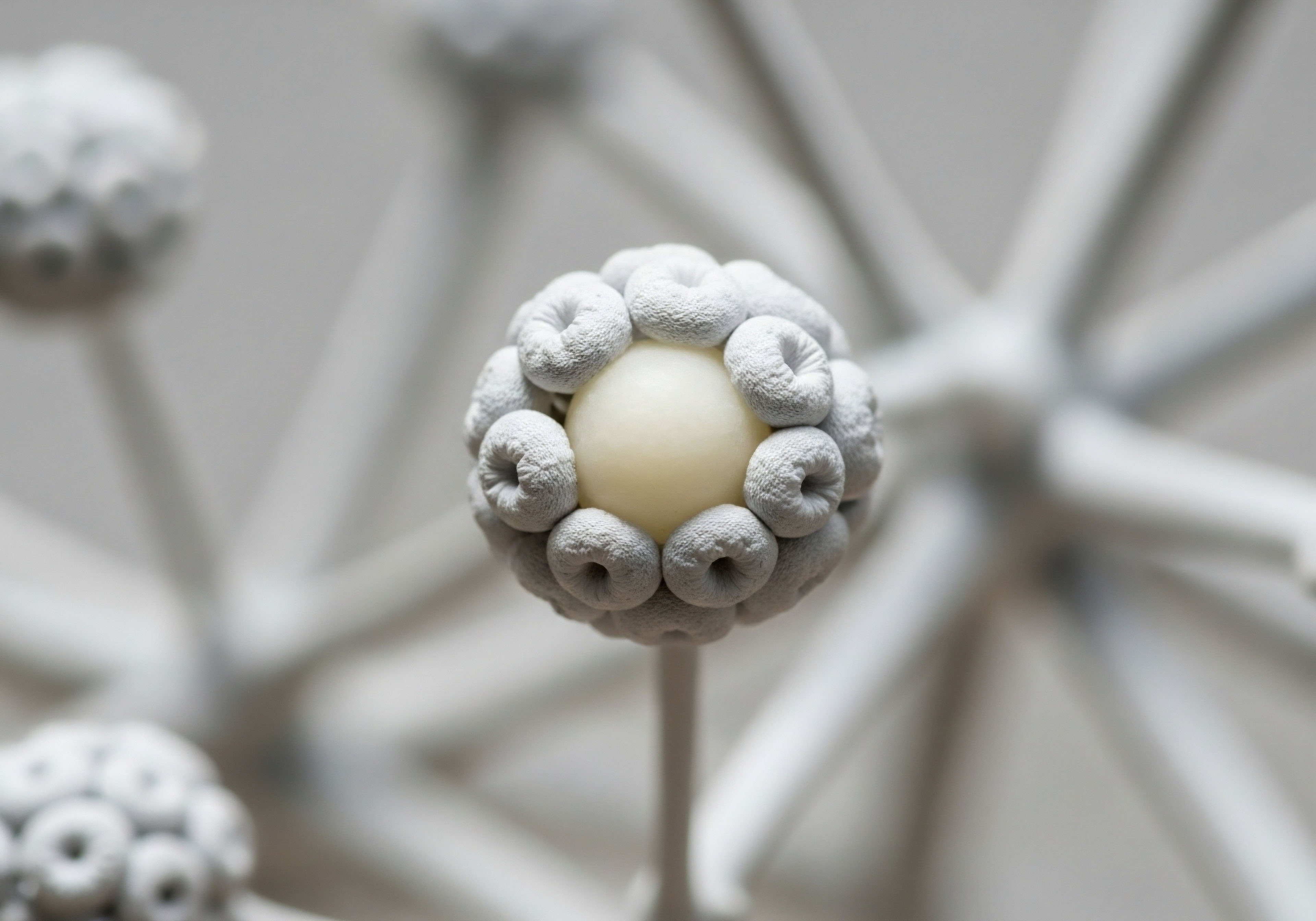

The Unseen Engine of Hormonal Renewal
Sleep is the bedrock of biological function, far removed from passive downtime. It is an active, dynamic period where the body undertakes critical repair, recalibration, and rejuvenation processes. At the heart of this nightly restoration lies the intricate orchestration of our endocrine system.
Hormones, the body’s master chemical messengers, are profoundly influenced by sleep quality and duration. Optimizing sleep is not merely about feeling rested; it is a direct pathway to reclaiming and enhancing hormonal vitality, metabolic efficiency, and cognitive sharpness. This foundational understanding positions sleep as a primary lever for achieving peak physiological output and sustained well-being.

The Hormonal Cascade Unveiled
During waking hours, the body operates under constant demands, managing energy expenditure, stress responses, and external stimuli. Sleep provides a crucial window to reverse these catabolic processes and initiate anabolic ones, driven by a precisely timed release of key hormones.
This orchestrated release ensures that tissues are repaired, energy stores are managed, and the body’s internal chemistry is reset for optimal function upon waking. Understanding this hormonal symphony is the first step in appreciating sleep’s role as a fundamental pillar of health and performance.

Cortisol’s Nightly Recalibration
Cortisol, often termed the “stress hormone,” plays a vital role in regulating metabolism, immune response, and wakefulness. Its release follows a distinct diurnal rhythm, with levels typically peaking in the early morning to facilitate arousal and gradually declining throughout the day. During healthy deep sleep, the Hypothalamic-Pituitary-Adrenal (HPA) axis, which governs cortisol production, is suppressed.
This nightly reduction allows the system to reset, preventing chronic elevation that can lead to detrimental effects like impaired immunity, increased abdominal fat, and disrupted sleep itself. Consistent, quality sleep ensures cortisol’s rhythm remains intact, signaling readiness for the day ahead.

Growth Hormone ∞ The Cellular Architect’s Blueprint
Growth Hormone (GH) is indispensable for cellular repair, muscle synthesis, bone density, and metabolic regulation. Its secretion is heavily concentrated during the deepest stages of sleep, specifically slow-wave sleep (SWS). This anabolic surge during sleep is when the body undertakes significant tissue regeneration and protein synthesis, essentially rebuilding and strengthening itself.
Insufficient or fragmented deep sleep directly curtails GH release, impairing the body’s capacity for repair and recovery, and contributing to age-related declines in muscle mass and metabolic function. Optimizing SWS is therefore paramount for leveraging sleep’s restorative power.

Melatonin and the Circadian Symphony
Melatonin, the hormone produced by the pineal gland, acts as the conductor of the body’s circadian rhythm, signaling the transition from wakefulness to sleep. Its production is suppressed by light exposure and stimulated by darkness, creating the internal clock that governs sleep-wake cycles, hormone release patterns, and numerous other physiological processes.
A well-regulated melatonin cycle, facilitated by consistent sleep and appropriate light exposure, underpins the synchronized release of other critical hormones. Disruptions to this cycle, often caused by irregular sleep schedules or excessive evening light, can cascade into broader hormonal imbalances.

Metabolic Regulators ∞ Ghrelin and Leptin’s Sleep Dependence
The hormones ghrelin and leptin are central to appetite regulation and energy balance. Ghrelin stimulates hunger, while leptin signals satiety. Sleep deprivation significantly disrupts the delicate balance between these two hormones. Studies indicate that insufficient sleep leads to increased ghrelin levels and decreased leptin levels, promoting increased appetite, particularly for high-calorie foods, and reducing feelings of fullness.
This hormonal dysregulation is a direct contributor to weight gain, insulin resistance, and an increased risk of metabolic syndrome. Quality sleep is therefore a critical component of maintaining metabolic health and hormonal equilibrium.


Engineering Your Endocrine System through Sleep
The body’s hormonal system operates with remarkable precision, akin to a sophisticated engineering network. Sleep serves as the primary maintenance and optimization period for this network. Understanding the mechanisms by which sleep influences hormone production and regulation allows for targeted strategies to enhance physiological output. This involves recognizing the distinct roles of different sleep stages and their impact on hormonal pathways, particularly the Hypothalamic-Pituitary-Gonadal (HPG) axis and the HPA axis.

Sleep Architecture and Hormonal Release
Sleep is not a monolithic state but comprises distinct stages, each with unique physiological signatures. The two primary types are Non-Rapid Eye Movement (NREM) sleep, further divided into stages N1, N2, and N3 (deep sleep or slow-wave sleep), and Rapid Eye Movement (REM) sleep.
The hormonal landscape shifts dramatically across these stages, with deep sleep being the dominant phase for anabolic hormone release and REM sleep playing a role in cognitive and emotional processing, which also has downstream hormonal implications.

Deep Sleep ∞ The Anabolic Window
Slow-wave sleep (N3) is the powerhouse of hormonal rejuvenation. It is during this stage that the body releases the majority of its daily Growth Hormone (GH). This release is pulsatile and directly correlated with the depth and duration of SWS.
The absence of significant external stimuli allows the Hypothalamic-Pituitary-Gonadal (HPG) axis to function optimally, facilitating the release of gonadotropins (LH and FSH) which, in turn, stimulate the production of testosterone and estrogen. Furthermore, the suppression of the HPA axis during SWS allows cortisol levels to reach their nadir, providing essential rest for the stress response system.

REM Sleep ∞ Cognitive and Emotional Synthesis
While deep sleep is dominant for GH and foundational hormone regulation, REM sleep is critical for cognitive functions, memory consolidation, and emotional processing. Hormonally, REM sleep is associated with fluctuations in neurotransmitters and can influence the HPG axis, particularly in relation to reproductive hormones and mood regulation. Disruptions to REM sleep, often caused by fragmented sleep or certain medications, can impair cognitive performance and contribute to mood disorders, indirectly impacting hormonal balance through stress pathways.

The HPG Axis and Sleep Quality
The Hypothalamic-Pituitary-Gonadal (HPG) axis is central to the production of sex hormones, including testosterone and estrogen. This axis is highly sensitive to sleep. Chronic sleep deprivation and poor sleep quality lead to a reduction in the pulsatile release of Gonadotropin-Releasing Hormone (GnRH) from the hypothalamus, which in turn reduces Luteinizing Hormone (LH) and Follicle-Stimulating Hormone (FSH) from the pituitary.
This diminished signaling directly results in lower testosterone production in men and can impact estrogen and progesterone balance in women, affecting libido, muscle mass, bone density, mood, and energy levels.

Gonadotropin Release and Testosterone Synthesis
The rhythmic release of LH, a key gonadotropin, is strongly influenced by the circadian clock and sleep patterns. Optimal timing and duration of deep sleep are essential for maintaining the integrity of this pulsatile release. When sleep is compromised, the frequency and amplitude of LH pulses decrease, leading to suboptimal stimulation of Leydig cells in the testes.
This results in a measurable decline in testosterone synthesis. This is not a matter of passive decline but an active consequence of a disrupted biological system, underscoring the direct link between sleep architecture and reproductive hormonal health.
Clinical data consistently demonstrates that even a few nights of sleep restriction can lead to significant reductions in testosterone levels, comparable to the effects of aging by a decade.
The precise mechanisms involve complex interactions between sleep-dependent neurotransmitters and the central regulation of the HPG axis. Melatonin, for instance, has been shown to influence GnRH secretion, further highlighting the interconnectedness of the sleep-wake cycle and reproductive hormone production. Ensuring adequate sleep is thus a direct strategy for optimizing endogenous testosterone and estrogen production, crucial for vitality, body composition, and overall physiological resilience.
Consider the body as a finely tuned machine. Sleep is not merely the downtime; it is the scheduled maintenance period where essential recalibrations occur. Without this period, components degrade, and performance diminishes. The hormonal system, in particular, relies on this restorative phase to ensure optimal output and function. By understanding and prioritizing sleep’s role in hormonal regulation, individuals can proactively manage their endocrine health and unlock higher levels of performance and vitality.


Timing Your Recovery for Peak Physiological Output
The effectiveness of hormonal rejuvenation through sleep is critically dependent on timing and consistency. It is not simply about accumulating hours in bed, but about aligning sleep patterns with the body’s natural circadian rhythms and ensuring the quality of sleep stages necessary for hormonal release. Understanding ‘when’ to prioritize sleep and ‘when’ hormonal signals are most active provides a strategic advantage in optimizing physiological output and long-term health.

Aligning with Your Circadian Blueprint
The body operates on an approximately 24-hour internal clock, the circadian rhythm, which dictates the timing of numerous physiological processes, including hormone secretion, body temperature, and metabolism. This rhythm is primarily entrained by the light-dark cycle. For optimal hormonal health, sleep must be synchronized with this internal clock. This means establishing a consistent sleep-wake schedule, ideally aligning sleep with the natural onset of darkness and waking with the natural rise of light.

The Criticality of Consistent Sleep Schedules
Irregular sleep patterns, characterized by shifting bedtimes and wake times, profoundly disrupt the circadian rhythm and, consequently, hormonal regulation. This inconsistency can blunt the pulsatile release of hormones like Growth Hormone and gonadotropins and lead to dysregulation of the HPA axis, resulting in elevated cortisol. Maintaining a consistent sleep schedule, even on weekends, reinforces the body’s natural timing mechanisms, allowing for predictable and optimal hormonal release during sleep. This consistency is a non-negotiable prerequisite for hormonal rejuvenation.

When Hormonal Deficits Signal Sleep Dysfunction
Certain hormonal imbalances are clear indicators of underlying sleep dysfunction. For instance, persistently low testosterone levels, particularly when accompanied by fatigue, reduced libido, and poor mood, often point to insufficient deep sleep or disrupted HPG axis function. Similarly, chronically elevated cortisol levels, manifesting as anxiety, difficulty losing weight, and sleep disturbances, suggest HPA axis dysregulation, frequently exacerbated by poor sleep hygiene and stress. Recognizing these hormonal signals provides a diagnostic cue to investigate and optimize sleep patterns.

Proactive Strategies for Hormonal Renewal
Hormonal renewal through sleep is an ongoing process, not a one-time fix. It requires a proactive and consistent approach to sleep hygiene. This involves creating an environment conducive to deep sleep, managing light exposure throughout the day and evening, and establishing a relaxing pre-sleep routine. By consistently applying these principles, individuals can maximize the benefits of sleep for their endocrine system, supporting everything from metabolic health and cognitive function to physical recovery and long-term vitality.
The timing of sleep and its quality are not incidental; they are engineered biological events. The body’s hormonal systems are designed to function optimally within a predictable, restorative sleep cycle. When this cycle is respected and optimized, the body reaps the rewards of enhanced hormonal balance, improved metabolic function, and robust cellular repair. Proactive management of sleep is, therefore, a direct investment in sustained physiological performance and enduring vitality.

Mastering Your Biological Prime
The science is unequivocal ∞ deep sleep is not a passive state but a powerful, active phase of hormonal recalibration and cellular regeneration. It is the architect of our endocrine health, dictating the release of growth hormone, the regulation of cortisol, the rhythm of melatonin, and the balance of metabolic hormones.
To neglect sleep is to undermine the very foundations of our physiological capacity, leading to diminished vitality, impaired cognitive function, and accelerated aging. By understanding and prioritizing the ‘why,’ ‘how,’ and ‘when’ of sleep’s hormonal impact, individuals can harness this potent biological process to optimize their internal chemistry, achieve peak performance, and master their biological prime. This is not about merely managing symptoms; it is about fundamentally upgrading the body’s operating system through the profound science of restorative sleep.

Glossary

endocrine system

physiological output

deep sleep

cortisol

cellular repair

growth hormone

circadian rhythm

melatonin

metabolic health

sleep stages

hpa axis

rem sleep

testosterone

hormonal balance

hpg axis




